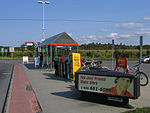Beaverbrook, Ottawa
Neighbourhoods in OttawaUse Canadian English from January 2023
Beaverbrook is a suburban neighbourhood in Kanata North Ward in the city of Ottawa, Ontario, Canada. It is located within the former city of Kanata. Beaverbrook is known for its hedged houses and community facilities. The neighbourhood is bounded by the Kanata North Business Park to the north, March Road to the east, Campeau Drive to the south and Knudson Avenue & Weslock Way to the west. According to the Canada 2011 Census, the total population of the neighbourhood was 5,182.
Excerpt from the Wikipedia article Beaverbrook, Ottawa (License: CC BY-SA 3.0, Authors).Beaverbrook, Ottawa
Kingsford Crescent, Ottawa Kanata
Geographical coordinates (GPS) Address Nearby Places Show on map
Geographical coordinates (GPS)
| Latitude | Longitude |
|---|---|
| N 45.326111111111 ° | E -75.901388888889 ° |
Address
Kingsford Crescent 24
K2K 1S5 Ottawa, Kanata
Ontario, Canada
Open on Google Maps




